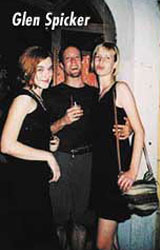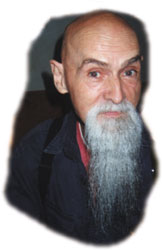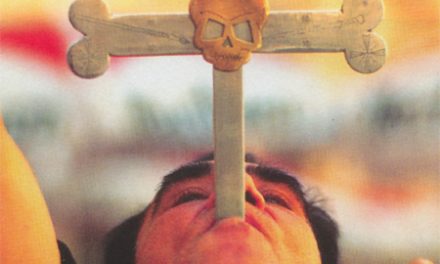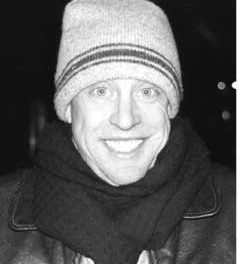For most of us who live here, this is simply part of the city, and something we take for granted, but these things are gifts from those who came before us, hard fought and hard won.
To those who have been here long enough, the stark grey walls and listless decay that used to be the city probably seem more real than the glittery mirage that dances in front of the eyes today.
I, for one, freely admit of my near total ignorance of the way things used to be, but can firmly assert that my eyes are now fully open, after hearing the stories of those who, at least in part, helped to bring color and life into a once bleak and dilapidated landscape. To break out of the luxurious haze, we now bend prostrate to our predecessors, the pioneers who transformed Praha into the city we know and love (or love to hate) today.
I recently received history lessons from some of Prague’s originals, including John Bruce Shoemaker, former owner of Marquis de Sade, Glen Emery, Jo’s Bar founder and owner Bukowski’s in Zizkov, Glenn Spicker of U Maleho Glena and the Museum of Communism, Bethea Zoli of Radost, and Frank Haughton, who owns just about everything. Here’s what they had to say about navigating the uncharted waters of new capitalism.
Where have all the flowers gone?
Amazingly enough, the ex-patriots who lived here just after the revolution didn’t despise each other quite so much, and even helped each other out on occasion. The “scene” was small enough then to be called a community, and adhered to the nomer in more ways than size.
John Bruce Shoemaker (who tragically passed away on Oct. 5, 2010 at just 48) explained to me that “there were only three or four places you could drink” in the center, and told of a place called the Stalin Club under the metronome, where everyone would go and inevitably miss the last tram, then stagger down towards the then empty Ungelt to grab a spot to sleep for the night.
“Everyone was very friendly and helpful to each other,” John mused, a sad contrast to the “infighting” that goes on today. Little Glenn also acknowledged that things have “changed a lot”, but did so with a certain detached resignation.
“Everybody knew each other back then,” said Glen Emery over a darkening table at Zelezne Dvere (The Iron Door), and confidently asserted that “if [any ex-pat] has been here for ten years I’d know them”.
Bethea stressed the greater amount of curiosity in people, the desire to get to know new people and new things. “I loved when there were a lot more foreigners mixing in with the Czechs,” she recalled with a wistful look, obviously of a friendlier time. Glen Emery talked of the disappearance of characters from a “really exciting time”, and their niche being filled with “suits”, creating an expat atmosphere that’s “business as usual”.
Little Glenn sighed that “very few of the veterans [are still here],” and cited the growing presence of “junior year abroad people”, but referred to the transformation as a general maturing process; a natural step on the road to becoming a truly international city.
Never take your eyes off the Man
It wasn’t all fun times and togetherness for these intrepid few. The legal hassles, red tape, harassment and general bad vibes would have turned back El Dorado, but focused on the goal, they forged ahead.
“If you didn’t pay bribes, you didn’t get anything done,” one said in the matter of fact tone that only sleeping with corruption can bring. He described “[drug-dealers] shaking hands with policemen,” and the Czech police as “keystone cops with guns”.
Emery described the early situation with Czech officials and legal offices as “very ambiguous” with a lot of “catch 22s”, but emphasized that it was more a lack of experience than a direct prejudice against foreign entrepreneurs that caused most of the problems, and Glen agreed, saying that he didn’t think it was anything specifically against foreigners.
Bethea found her club the target of such ludicrous attacks as being the reason drugs were coming into the city, instead of the problem being treated as a natural result of the opening of markets and the culture, as it should have been. She also, after nobly trying to avoid the ugly subject, admitted to receiving second-class treatment because of being a woman. I know this is hard to imagine in a country as advanced as the Czech Rep is in gender politics, but try. She let her Slovakian husband, Richard, handle most of the business side of things, quite aware that “if somebody wanted a complete answer, it wasn’t going to come from me.”
Little Glenn and Frank Haughton whistled a slightly different tune. Frank mentioned a certain lack of a “sense of humor” in the process and the officials, but he took most of the blame for his initial difficulties, musing that “maybe [he] created them [himself].”
After some significant prodding on my part, Glenn admitted that “there were a lot of hoops to jump through,” but also added that he didn’t think it would be much different anywhere else.
Haughton said that he ran into “very little that was unreasonable,” a very tolerant view from a man whose first bar, the James Joyce, was ordered to close down every Friday for the first nine months of its operation.
Haughton now owns and runs most of the city’s best Irish bars, and has achieved a sort of comfortable acceptance from the Czech officials. He attributes his success to asking for advice rather than doing first and trying to comply with regulations later. Glenn, who runs Bohemia Bagels with partners, said openly that “the rules make sense,” and that he also has cultivated a certain level of understanding with some of the officials. “We are treated like a Czech business,” he asserted.
School and Graduation
John Bruce described first coming to Prague as “walking into an ancient Mayan city; you see the history, but you’re also going ‘Whoa! There’s gold everywhere!'” Prague today reminds us more of a suburban mall than ancient ruins, and perhaps it’s easy to understand the flagging fascination with western culture.
“They’ve learned to hate us, as we deserve,” Emery added with a wry smile. Little Glenn later echoed these thoughts, adding that “now, certainly, they’ve had their fill of us,” with a guilty laugh. But is the legacy all neon?
Bethea expressed the opinion that “Czechs learned and grew a lot because of early interaction with foreigners,” adding that they are “intelligent and very strong” people, capable of looking at what foreigners are doing in their country and improving upon it.
However, she also added that typically Czech businessmen and women “fight each other instead of giving,” a problem in dire need of addressing.
Glen (the little) described a gradual change, where at first foreign businesses were regarded with a disinterested eye by Czech establishments, but then evinced greater interest. Bruce took a somewhat humbler line, referring to the history of the First Republic and the Empire, using the stories to illustrate Czech creativity and his belief that “it’s complete bullsh*t to say we changed or influenced them… we helped by opening the door… they already knew this stuff.”
Everyone has different reasons for coming to a foreign country to live, but a common thread was certainly business, to some degree. Frank Haughton cited his reasons as “purely business” at first, but later came to realize that “[he] had brought something… that people actually appreciated,” with his Irish pubs, perhaps contributing in some way to the growth of a culture.
Emery was more aware of his potential role, saying “I knew I was bringing something new to Prague,” and to people previously “stifled by the regime,” but also referred to the difficulty of gauging the growth and the amount that foreign influence has contributed to that growth: “when you see your child grow up, you don’t really notice it growing up. ” Bethea talked of the excitement of “show[ing] people another way of doing business,” and of the gratification of watching Czechs “falling in love with [the dance scene].”
As far as the future, all the owners emphasized the necessity of constant redefinition. “You can never stop changing,” saged Bethea. Haughton said that Czech clients, and making his establishments more Czech-friendly, is the only road to success. As far as a legacy worth leaving to Czechs and Czech culture, everyone interviewed expressed very optimistic views for the future of the city and the future of Czech business and Czech entrepreneurs.
Perhaps some of the more bitter out there could learn something, seeing as how the most complimentary opinions are coming from those who had the hardest road to haul. As far as a sweeping piece of advice on how to live life, perhaps Frank’s words put it best: “Just say f*ck it sometimes.”





